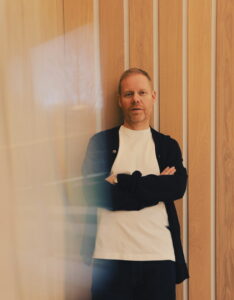 CalendarProgramme
CalendarProgrammePodcast
DE
 CalendarProgramme
CalendarProgramme
Max Richter is one of the most influential and acclaimed composers of all time. His fusion of classical technique and electronic technology, heard across genre-defining solo albums and countless scores for film, dance, art and fashion, has won him legions of fans around the world and blazed a trail for a generation of musicians.
His ninth solo album – the first to be written and recorded at his serene new studio in rural Oxfordshire – is a fleeting self-portrait of a musician in constant motion. In A Landscape is a record about “reconciling polarities,” as Richter puts it, bringing together the electronic and the acoustic, the human and the natural world, the big questions of life and the quiet pleasures of living.
The 19-track album began life in summer 2022 as a natural counterweight to the urgent political tenor of his previous projects: Exiles, a ballet score about the refugee crisis, and Voices, constructed with a “negative orchestra” and hundreds of readings of the Universal Declaration Of Human Rights. Richter’s ongoing commissions, meanwhile, were similarly dramatic and conceptual, including a ballet adaptation of Margaret Atwood’s post-apocalyptic MADDADDAM, music for a Mark Rothko retrospective, and scores for Johan Renck’s sci-fi drama Spaceman and the Elisabeth Moss spy thriller The Veil.
The next project called for a recalibration. Shifting focus to Richter’s immediate surroundings, In A Landscape marks out a psychic space in which to meditate on the present while recognising a lifetime of artistic influence, from Bach and Purcell to the poetry of Keats, Wordsworth and Shakespeare. “It’s me having a look around, trying to examine where I'm at,” he suggests, “like a memoir.”
In A Landscape is his first solo album recorded at Studio Richter Mahr, the minimalist, eco-conscious creative retreat designed and operated by Richter and his wife, visual artist Yulia Mahr. “The whole building is like an instrument,” he says. “There's an element of exploring the capabilities of the building, how all the spaces sound, all the textures of things, and trying to explore the fingerprint that it has.”
The creative process was deliberately minimal, with Richter writing notation by hand and restricting his palette to just a few colours: string quintet, grand piano, Hammond organ and MiniMoog, plus tape delays, vocoders and reverbs. “I’m always looking for ways to get to the essence of things, to get to the simplest version of everything.”
Interspersing the studio compositions are nine ‘Life Studies’ assembled from field recordings and the hubbub of the everyday: footsteps through the woods, eggs sizzling in the kitchen, a Hong Kong airport trolley, practising Mozart on the piano. These simple acts of noticing from a zen-minded creative bring the “landscape” of the album’s title into focus, calling back to the found sounds that distinguished Richter’s breakthrough albums, 2002’s Memoryhouse and 2004’s The Blue Notebooks.
From its darkly enveloping prelude (‘They Will Shade Us With Their Wings’) to the sombre elaboration of 17th century English composer John Eccles (‘Love Song’), the album deepens Richter’s lifelong search for both “emotional directness and beautifully made things”. Luminous piano whorls (‘A Colour Field’) and pensive electronic clouds (‘Only Silent Words’) bring opposing energies together with the lightest touch: “The music is very simple-feeling, but all the notes are in the places I put them.”
In A Landscape also ponders our place in a damaged world. Responding to the windswept, proto-ecological imaginations of Wordsworth and the post-war poet Peter Redgrove, two pieces (‘And Some Will Fall’, ‘Late and Soon’) cycle through an 18th century harmonic sequence in blooms of strings and piano, echoing the poets’ earthbound imagery.
But in keeping with Rothko’s advice to include an ounce of hope in every artwork (“10%, to make the tragic concept more endurable”) the album concludes on a note of warmth and solidity, as the repeating bass of ‘Movement, Before All Flowers’ comes to rest. “A degree of hopefulness is important,” says the artist. “There’s an element of psychological responsibility.”
Over the last two decades, Richter has brought his distinctly humane and emotive sensibility to a series of ambitious projects – among them, a reimagining of Vivaldi’s violin concertos, the landmark nine-hour album Sleep and his score for Wayne McGregor’s ballet Woolf Works – along with acclaimed solo records tackling human rights, migration and the 2003 invasion of Iraq.
After spending many years grappling with big ideas and thorny social and political questions, the making of In A Landscape has opened up another, greener world for Richter. Making music remains, above all, “a way to make a kind of alternate reality,” a constructed world “where everything is in its place.”
Max Richter is one of the most influential and acclaimed composers of all time. His fusion of classical technique and electronic technology, heard across genre-defining solo albums and countless scores for film, dance, art and fashion, has won him legions of fans around the world and blazed a trail for a generation of musicians.
His ninth solo album – the first to be written and recorded at his serene new studio in rural Oxfordshire – is a fleeting self-portrait of a musician in constant motion. In A Landscape is a record about “reconciling polarities,” as Richter puts it, bringing together the electronic and the acoustic, the human and the natural world, the big questions of life and the quiet pleasures of living.
The 19-track album began life in summer 2022 as a natural counterweight to the urgent political tenor of his previous projects: Exiles, a ballet score about the refugee crisis, and Voices, constructed with a “negative orchestra” and hundreds of readings of the Universal Declaration Of Human Rights. Richter’s ongoing commissions, meanwhile, were similarly dramatic and conceptual, including a ballet adaptation of Margaret Atwood’s post-apocalyptic MADDADDAM, music for a Mark Rothko retrospective, and scores for Johan Renck’s sci-fi drama Spaceman and the Elisabeth Moss spy thriller The Veil.
The next project called for a recalibration. Shifting focus to Richter’s immediate surroundings, In A Landscape marks out a psychic space in which to meditate on the present while recognising a lifetime of artistic influence, from Bach and Purcell to the poetry of Keats, Wordsworth and Shakespeare. “It’s me having a look around, trying to examine where I'm at,” he suggests, “like a memoir.”
In A Landscape is his first solo album recorded at Studio Richter Mahr, the minimalist, eco-conscious creative retreat designed and operated by Richter and his wife, visual artist Yulia Mahr. “The whole building is like an instrument,” he says. “There's an element of exploring the capabilities of the building, how all the spaces sound, all the textures of things, and trying to explore the fingerprint that it has.”
The creative process was deliberately minimal, with Richter writing notation by hand and restricting his palette to just a few colours: string quintet, grand piano, Hammond organ and MiniMoog, plus tape delays, vocoders and reverbs. “I’m always looking for ways to get to the essence of things, to get to the simplest version of everything.”
Interspersing the studio compositions are nine ‘Life Studies’ assembled from field recordings and the hubbub of the everyday: footsteps through the woods, eggs sizzling in the kitchen, a Hong Kong airport trolley, practising Mozart on the piano. These simple acts of noticing from a zen-minded creative bring the “landscape” of the album’s title into focus, calling back to the found sounds that distinguished Richter’s breakthrough albums, 2002’s Memoryhouse and 2004’s The Blue Notebooks.
From its darkly enveloping prelude (‘They Will Shade Us With Their Wings’) to the sombre elaboration of 17th century English composer John Eccles (‘Love Song’), the album deepens Richter’s lifelong search for both “emotional directness and beautifully made things”. Luminous piano whorls (‘A Colour Field’) and pensive electronic clouds (‘Only Silent Words’) bring opposing energies together with the lightest touch: “The music is very simple-feeling, but all the notes are in the places I put them.”
In A Landscape also ponders our place in a damaged world. Responding to the windswept, proto-ecological imaginations of Wordsworth and the post-war poet Peter Redgrove, two pieces (‘And Some Will Fall’, ‘Late and Soon’) cycle through an 18th century harmonic sequence in blooms of strings and piano, echoing the poets’ earthbound imagery.
But in keeping with Rothko’s advice to include an ounce of hope in every artwork (“10%, to make the tragic concept more endurable”) the album concludes on a note of warmth and solidity, as the repeating bass of ‘Movement, Before All Flowers’ comes to rest. “A degree of hopefulness is important,” says the artist. “There’s an element of psychological responsibility.”
Over the last two decades, Richter has brought his distinctly humane and emotive sensibility to a series of ambitious projects – among them, a reimagining of Vivaldi’s violin concertos, the landmark nine-hour album Sleep and his score for Wayne McGregor’s ballet Woolf Works – along with acclaimed solo records tackling human rights, migration and the 2003 invasion of Iraq.
After spending many years grappling with big ideas and thorny social and political questions, the making of In A Landscape has opened up another, greener world for Richter. Making music remains, above all, “a way to make a kind of alternate reality,” a constructed world “where everything is in its place.”